| SHADOWS ON THE WALL | REVIEWS | NEWS | FESTIVAL | AWARDS | Q&A | ABOUT | TALKBACK | |||||
 Shadows off the beaten path Shadows off the beaten pathIndies, foreign, docs and shorts... | |||||
| See also: SHADOWS FILM FESTIVAL | Last update 9.Dec.21 | |||||
|
Beyto Review by Rich Cline | 
| |||||
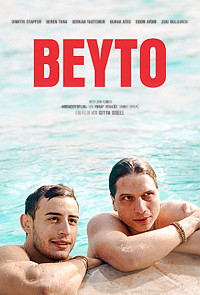 dir-scr Gitta Gsell prd Magdalena Welter, Louis Matare, David Fonjallaz with Burak Ates, Dimitri Stapfer, Ecem Aydin, Beren Tuna, Serkan Tastemur, Zeki Bulgurcu, Mujdat Albak, Delia Antonio, Danijela Milijic, Zeynep Sanli, Ebru Koyun, Mustafa Basalan release Swi Sep.20 zff, US 7.Dec.21 20/Switzerland 1h38 Is it streaming? |
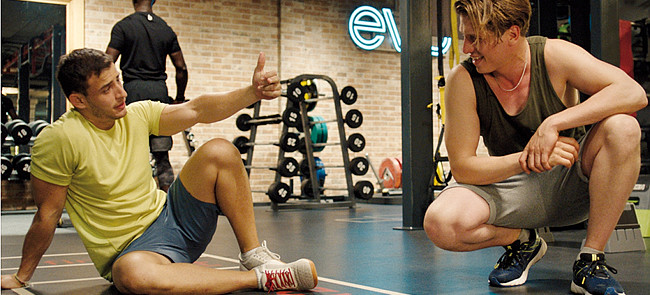 A knowing, thoughtful culture-clash drama, this film has a strong sense of the tension between old-world traditions and present-day values, seen here through the eyes of Turkish immigrants in Switzerland. Based on a novel, the central idea is that to Europeans it's unthinkable that parents would force their child into a loveless marriage. But writer-director Gitta Gsell tells the story with sensitivity and understanding, refusing to vilify anyone. A top IT student, Beyto (Ates) works in his family's Turkish cafe in Bern. He's also a rising-star swimmer who has begun training with veteran teammate Mike (Stapfer). While Beyto's friends pressure him to be more of a macho thug, he prefers hanging out with the openly gay Mike. And as they grow closer, their mutual attraction soon blossoms into romance. Meanwhile, Beyto's parents (Tuna and Tastemur) have lined up good Turkish girl Seher (Aydin) for him, and when they take him to their home village for a visit, they have a surprise marriage planned. Mike has his own family issues, because his religious parents have rejected him. But he finds freedom in living honestly away from them. By contrast, Beyto is unable to sever those strings, even as his parents insist to him that family is more important than love. It's startlingly telling when an uncle tells Beyto that love can wait until everything else is taken care of. The film is sharply shot in both Switzerland and rural Turkey, capturing cultural details that add depth to the sometimes melodramatic plot. Performances are earthy and honest, tapping into complex feelings under the surface. As the sporty, handsome Beyto, Ates is an engaging young man who is finally beginning to understand who he is and now needs to fight if he wants to be truthful. His chemistry with the loose, likeable Stapfer is sweet and charming. And his relationship with his unbending parents is remarkably textured, played with surprising nuance by Tuna and Tastemur. Meanwhile, Aydin adds her own superb angles to the story, becoming a particularly strong character in the final act. Phrases like "joining the army will make a man out of you" sharply reflect the deep misunderstanding about masculinity that infuses some cultures. This fear of homosexuality only leads to lies that often put young people's lives in danger. The script balances this with a bracing understanding of various perspectives, although a resolution certainly will never come easily if parents are so short on understanding and compassion, forcing their children to live a lie.
| ||||
|
France Review by Rich Cline | 
| |||||
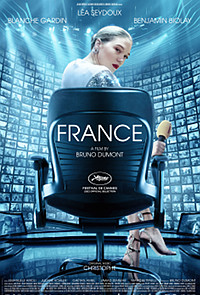 dir-scr Bruno Dumont prd Rachid Bouchareb, Jean Brehat, Muriel Merlin with Lea Seydoux, Blanche Gardin, Benjamin Biolay, Emanuele Arioli, Juliane Kohler, Gaetan Amiel, Jawad Zemmar, Marc Bettinelli, Lucile Roche, Annick Lavieville, Noura Benbahlouli, Abdellah Chahouat release Fr 25.Aug.21, US 10.Dec.21 21/France 2h13 CANNES FILM FEST TORONTO FILM FEST Is it streaming? |
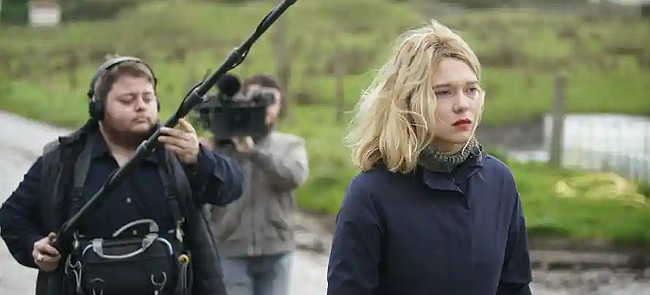 Adeptly capturing the rude cynicism of journalists behind the scenes, this lively comedy-drama feels like a departure for filmmaker Bruno Dumont, who usually takes on provocatively serious stories. But his pointed touches start early, challenging the viewer to understand that this isn't actually a satire. It's a scattershot, chillingly realistic portrait of a society out of balance, and also an overlong saga about a privileged woman's crisis of confidence. After President Macron calls her by name at a press conference, hot-shot TV journalist France (Seydoux) is almost giddy as she heads into a North Africa conflict zone. Back home she lands in gossip rags when she accidentally knocks a young man (Zemmar) off his scooter. Her producer friend Lou (Gardin) dismisses the incident, but trying to make amends causes France to examine her life, which begins to unravel under the scrutiny. So she runs away to a snowy mountain spa, where she meets refreshingly nonplussed Latin teacher Charles (Arioli). But he has a secret. It's fascinating to watch France craft her field reports, asking gun-toting militants to pose for cutaways with quite a bit lost in the translation. Then in her palatial flat, France has a strangely muted relationship with her novelist husband Fred (Biolay). Dumont repeatedly adds offbeat camera flourishes to explore France's interaction, some of which spark ideas while others feel indulgent. As her trials become increasingly personal, leading to some unsettling moments, it's the deeper themes that hold the interest. Seydoux is terrific as the confident, glamorous professional whose internal world begins to wobble, realising that she's just like the fake people she hates. It's a delicately layered performance, as France struggles to free herself from the box she's put herself into, so she can look her savvy preteen son (Amiel) in the eye. Biolay remains pointedly enigmatic as Fred, cleverly keeping their relationship out of focus. And Arioli is magnetic as a young man whose face-value approach to the world catches France off-guard, further fuelling her downfall. Dumont's script is smart and complex, less an attack on journalism than on a society in which everything is a product and image is everything. The real targets of vitriol are the self-serving politicians France confronts on-camera, and even there Dumont seems to be admitting that there's no way they can ever truly do the right thing. It's easy to sympathise with France's need for approval, but her crisis of self-confidence feels oddly shallow. So in the end, the film is perhaps more shocking than illuminating.
| ||||
|
Lamb
Review by Rich Cline | 
| |||||
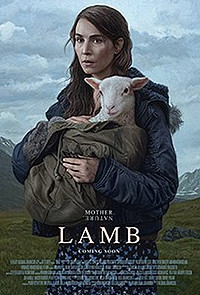 dir Valdimar Johannsson scr Sjon, Valdimar Johannsson prd Hronn Kristinsdottir, Sara Nassim, Piodor Gustafsson, Erik Rydell, Klaudia Smieja-Rostworowska, Jan Naszewski with Noomi Rapace, Hilmir Snaer Gudnason, Bjorn Hlynur Haraldsson, Ingvar E Sigurdsson, Agnes Emma Charlesdottir Guanci, Lara Bjork Hall, Ester Bibi Asgeirsdottir, Arnthrudur Dogg Sigurdardottir, Theodor Ingi Olafsson, Sigurdur Elvar Vidarson, Gunnar Thor Karlsson, Kristin Anna Valtysdottir release Ice 24.Sep.21, US 8.Oct.21, UK 10.Dec.21 21/Iceland 1h46 CANNES FILM FEST  Now streaming... |
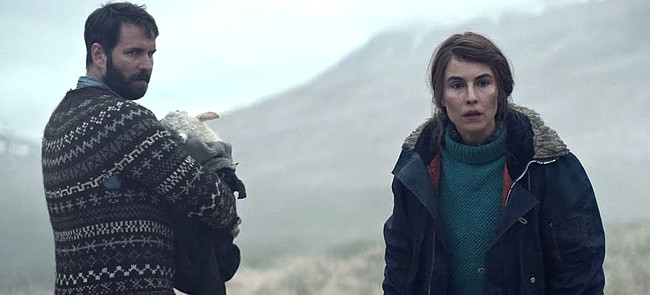 The sheep are clearly up to something sinister in this quirky Icelandic thriller, which cleverly plays out with a darkly emotional undercurrent. Filmmaker Valdimar Johannsson unfolds the story skilfully, using inventive camerawork and effects to pull the audience into an unnervingly strange situation. It's all rather minimalistic when it comes to explanations or detail, but the revelations are beautifully handled. And the film's bonkers narrative is unusually gripping. On a remote farm in Iceland, Maria and Ingvar (Roopace and Gudnason) have no children of their own, lovingly caring for their newborn lambs. When one is born with a surprising physicality, they adopt her as their own, becoming protective when the sheep try to get her back. Soon they become a warmly happy family. Then Ingvar's always-in-trouble brother Petur (Haraldsson) turns up. He doesn't know what to make of this lamb they've named Ada, but quietly tries to take her in stride. And he also struggles with what he should do about her. Maria and Ingvar's life is depicted with a remarkable sense of isolation, as details about them are quietly revealed. The camera also captures an uncanny sense of personality in the faces of the sheep, raising the question of who's farming whom. Even their house-cat and sheepdog seem more alert to nature. Johannsson's earthy approach adds disarming realism to the story's most extraordinary touches, creating truly heart-stopping moments without ever over-egging anything. Performances are deliberately subdued, channeling big feelings into tiny flickers of expression. Rapace and Gudnason are compelling and sympathetic, with a nicely understated chemistry. So as their actions and reactions become increasingly surreal, we're actually pulled in deeper. We realise how effective this has been in a key moment with Heraldsson's nice-guy loser Petur, who takes his own journey as he grapples with his response and begins to find himself. The story can of course be read on several levels, provocatively tapping into family issues from unhinged mythological angles. The relentlessly dry Scandinavian sense of humour continually catches us off-guard, narrowly avoiding a shift into broad farce or soapy melodrama. This is no mean feat, as the premise could easily have been played for laughs instead of chills. So the way Johannsson makes us feel things so deeply is remarkable. And even if it drags a bit in the final act, the story's astonishing conclusion impossible to forget.
| ||||

See also: SHADOWS FILM FESTIVAL © 2021 by Rich Cline, Shadows
on the Wall
HOME | REVIEWS | NEWS | FESTIVAL | AWARDS
| Q&A | ABOUT | TALKBACK | | ||||
